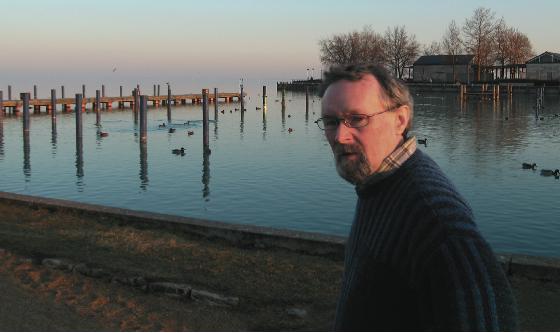 |
|
HOME | PROCLAMATION! MAGAZINE | DEVOTIONALS | STUDIES | LETTERS | ABOUT US | RELATED WEBSITES |
|
HOME / PROCLAMATION! MAGAZINE / 2009 / JANUARY/FEBRUARY / BURY
JANUARY / FEBRUARY 2009
VOLUME 10, ISSUE 1
A R T I C L E S

How I discovered the truth about Adventism
Adrian Bury writing from Hungary
I was born and brought up in a small industrial town in north-western England. My father was a Christian, and my earliest memory of church is of enjoying the services and Sunday school of a small mission. My father's family background was Baptist. One of his brothers became a missionary to India, and many of his cousins were staunch members or ministers of Baptist or Methodist churches. In other words, I have a strong Christian background. I remember growing up being aware of needing to "ask Jesus into my heart"—but I did not understand "following Jesus", and my personal experience with Him was not very strong.
After I finished school I moved to London to attend university. I had Christian friends there, but I ended up drifting away from God. I became involved in university life, in the arts, and in ignoring God, just as many others did.
There came a crisis point in my life, however, just before I completed my PhD, when I became overwhelmed with fears about the future. Most of my friends thought I was going nuts, but one Christian friend just dropped the comment that I hadn't been to church recently. At that point I made a decision. I went to my room and just prayed something like, "Jesus, I'm sorry about all this, but I really want to take you seriously from now on, so please come into my heart." The words were simple, but a major change took place. The next day, all my fears had gone, and I had peace. I knew what had happened was real.
Different denominations, consistent gospel
From the time I was saved, I did not consider myself as belonging exclusively to one denomination. While I was still in London, I attended an Evangelical Anglican church which was popular with the students. When I finished university and returned home, I attended the Baptist church with my parents, and after a few months, I was baptized in water. Meanwhile, my parents were friendly with a Pentecostal pastor who was about my age, and he talked to us about the Holy Spirit. I asked him to pray for me, and from then on I experienced and understood the Holy Spirit as Someone who is real, not merely abstract or theoretical.
Soon after that I moved to Hungary to continue my studies. Although the country was still under communist control, I was able to get involved with a couple of Baptist churches there without experiencing any real problems. On returning home I got married, and we eventually moved to Bangor in Wales where I taught chemistry for about ten years, also attending and ministering in the Assemblies of God church there.
As I review my experience in these different churches, I realize that while practices and emphases varied, the gospel preached was always the same. None of these churches redefined biblical terms. None of them changed or re-interpreted the Bible to make it appear to mean the opposite of what it really says. None of these groups claimed to be the one true church. Each one, instead, taught the life, death, and resurrection of Jesus—His completed, finished work—as the one way we must be saved.
Throughout the approximately 40 years of my pre-conversion and Christian life in Britain, I never remember meeting any Seventh-day Adventists, seeing any of their literature, or being aware of their presence. Adventism was included in some of the books I read on cults, but I did not pay much attention to this information as I had never met any Adventists.
I had no real concept of the Sabbath either. During my childhood my father must have been a mild Sunday-keeper, but we did not make an issue of Sunday holiness, and I don't know what my father understood about "Sabbath". Much later, when I was attending church in Wales, I remember reading Romans 14:5, that one man considers one day sacred but others don't, and that fact really stood out to me. From that point I decided Sunday did not have to be taken as especially holy; it was just the day on which we held our meetings.
About twelve years ago I felt God's call to move back to Hungary and work for him there. The first church I was connected with, though of the same denomination as my present one, was overly controlling and oppressive. Through this experience I learned about the phenomenon of spiritual abuse, that a church may have a cultic style of practice even if its statement of "theology" seems pretty well in order.
Meet Fred
I stayed in the above church for as long as I could, but in the meantime I became friendly with someone from a church about 10 km away. Let us call him Fred. His grandparents on his mother's side were Christians, but his father was a member of the communist party. His grandparents took him to church occasionally, and he accepted Jesus at the age of 16 and experienced a real conversion. His parents were not pleased and felt Fred had shamed them by becoming a Christian.
The church Fred was saved in was Pentecostal (EPF), but this denomination in Hungary is historically very legalistic. His wife and he ended up leaving and joining the Faith Church, which was illegal under the communists but in the period following the political changes underwent a period of rapid growth. This group was the most dynamically growing and charismatically oriented church in Hungary at the time.
Fred has a gift of evangelism, and more and more people around him began receiving Christ. Unfortunately, the local church leadership looked on his success with suspicion as a threat to their authority. Eventually he left that congregation, but because he was not going to give up Jesus, he returned to the more legalistic Pentecostal church. That church experienced a split in the congregation somewhat later, and Fred found himself looked upon as some kind of leader among those who preferred a lively style of worship. Fred then realized he needed to get some training. He was working full time, however, and the only Bible college offering a state-accredited college degree by correspondence at that time was called Sola Scriptura.
A bit of background will be helpful. During the early communist period, state control over the churches began to solidify, and some of the so-called "small churches" decided to cooperate together in order to survive. They formed the "Free Church Council" in 1950, and the members included the Evangelical Pentecostal Fellowship, the Seventh-day Adventist Church, the Church of God, the Baptist Church, the Christian Brethren, the Methodist Church, and others. The council was able to operate just one training institute for ministers where pastors for all the churches were trained by teachers provided from all of the movements. During the seventies the Adventist church experienced a split resulting in two movements: the Seventh-day Adventist Church, which continued to cooperate with other churches, and the Christian Advent Fellowship (CAF), which is rather more hard-line, historic Adventist, and did not continue associating with the other churches.
After the political changes, the Free Church Council was dissolved, and the various different denominations, including the two Adventist movements, opened their own colleges. Consequently, in 1976 the Christian Advent Fellowship opened the aforementioned Sola Scriptura. Some of the Sola Scriptura teachers had previously taught in the joint college, so they still have, so to speak, an interdenominational reputation. Other former joint college lecturers now teach at the official Seventh-day Adventist college and still have input into other denominations too, including the EPF. As a result of this situation, the general, interdenominational view of Adventists in Hungary is that they are a Christian denomination, and workers from many of the small churches attend Sola Scriptura for a "general theological education" because it has a good reputation. What they learn theologically at Sola Scriptura, however, is historic Adventism.
Blindsided by Adventism
Having had a very bad experience with the Faith Church and being unaware of what the Adventist movement represented, Fred eventually enrolled in a correspondence Bible college course at Sola Scriptura. He was in his first year of a three-year course when we met. We were both keen to see God move in the area, and we had other interests in common as well. I was a little puzzled that he was attending an Adventist college because I had read that some regarded them as a cult, but I dismissed the minor dissonance.
Soon Fred invited me to help teach in the church where he was an elder, so I agreed and made the move. Fred was continuing with his college course, and once I was a visitor to his class and sat in on a few lectures. Most of the teaching seemed fairly normal, except for the lesson on Daniel. They worked out 1844 from a couple of verses but gave no further explanation at the time. That was the first time I had heard about the importance of 1844 to the Adventists, and it sounded—well—strange.
As things progressed, Fred began saying things in sermons that I couldn't quite understand. I remember he once preached a sermon on the Holy Spirit, and I didn't have a clue what he was talking about.
On one occasion we were praying together before a meeting. I vividly remember the picture that came into my mind as we prayed: Fred's head was in the mouth of a huge snake which was trying to swallow him like a python does its prey. After briefly praying about the matter we did nothing more for the time being, but in retrospect I believe God was warning me that Fred was in the process of being led astray. Another time Fred said something like, "This Adventist teaching is either really, really bad, or it's really, really good!" Again, unfortunately, I didn't take the bait at the time. I then heard him give a Bible study, though not in our own church, which was very much based on the Adventist view of Revelation. I considered both his teaching and his secretive behavior in hiding this teaching from his friends in his own church to be highly inappropriate. As time passed Fred made more and more references to Adventist ideas. He started making cryptic comments about the Sabbath and soul sleep but without explaining what he really thought or understood by it. He also ended up getting into conflict with his wife about eating pork as well as over other issues of doctrine or practice. The next thing I knew, he was suicidal and wanting to drive into a brick wall on his motorbike. At last I became alarmed and realized I needed to do something.
Fred was clearly unwilling to explain properly what Adventism was really all about, though I had begun to suspect something was badly wrong, so I decided to check up on it independently.
I began researching Adventism, mainly using the internet. I discovered the Adventist teaching that the Sabbath is the seal of God and Sunday worship is the mark of the beast. I could not understand how anyone could take that notion seriously. I also came across the scapegoat teaching, according to which it is Satan who finally bears our sins. I must admit I was shocked by that.
Crisis intervention
Fred had finished college by this time and was thoroughly confused about doctrine. Although he had accepted the Adventist state of the dead teaching and found the Sabbath pretty convincing, he never really accepted Ellen White as a prophet. The whole situation caused quite a lot of stress for Fred's family because his wife was not at all happy with Adventism. I don't think she ever perceived it as being quite as unbiblical as it actually is, but she never accepted the distinctives. Our friendship also became strained, as did our ministering together in the church, as by this time we disagreed on quite a few things. I became quite worried and stressed, particularly as I began to study Adventist doctrines in more detail.
My relationship with Fred had reached a crisis. We could not discuss anything about doctrine without becoming angry and quarreling, so I really prayed and asked the Lord what I should do. I understood Him to say that Fred was suffering from spiritual abuse and what he really needed right then was a friend. I realized I needed to drop theological discussions with him for the time being: no more going on about the Sabbath, or the law, or whatever! I just had to leave it! I probably had become quite obsessive about these issues by then, so I found "leaving it" rather difficult, but I tried.
In the meantime, I decided to fast and pray for him, asking God to release him from the demonic forces I was by then convinced were latching onto him. I also continued to research and read. I could find no material on Adventism in Hungarian, so I decided I would have to write some myself. I began, therefore, to write a series of articles in Hungarian both for myself and for Fred, based on the research I had carried out.
About six months after my decision not to discuss theology, just before Christmas, I had to go to Budapest with Fred to pick up some Christmas parcels for distribution to poor families in the area. On our trip he made the comment that he was totally confused, his head was full of chaos, he did not know what to teach, and he had no idea anymore what was right and what was wrong. (It should be noted that he had already been saved for around ten years and had an acquaintance with Evangelical theology before any contact with Adventism). I then mentioned that I had certain studies on Adventism available which I could let him look at if he was interested. He was!
The result of his desperate agreement to read my studies was far more positive than I could have hoped! Fred did not become an Adventist after all, and we are still ministering together in the Pentecostal church. I praise God that He used my studies, among other things, to help Fred regain his foundation of biblical faith.
On this side of Fred's crisis I realize several things clearly. First, what had really drawn Fred to Adventism was the Sabbath, and what subsequently convinced him that a weekly holy day was irrelevant to the Christian life was a study of the covenants. Christians are vulnerable to Adventist Sabbath teaching if they are not aware of what the Bible teaches about the Abrahamic, the Mosaic, and the new covenants.
Second, I realize how subtle but pervasive Adventist teaching is. It is now several years since Fred's experience with Adventism, but even now he occasionally says things he must have learned at the college. Although on the whole he is pretty clear, we still need to discuss these doctrinal fallacies as they arise.
Finally, as a never-been Adventist, I have become quite familiar with Adventist theology and history. God is using my research in broader ways, and there have been occasions when I have been asked to teach on Adventism, both on a personal level and to larger groups. He is faithful to use all our experiences for our instruction as well as for His glory! †
Adrian Bury moved to Hungary from North Wales in 1995 at what he believed was the leading of the Holy Spirit. Since 1999, he has been part of the leadership team of a Pentecostal congregation in a small town in Western Hungary. At various times he has also ministered in other local churches and taught systematic theology at the Pentecostal Theological College.
![]()
Copyright 2009 Life Assurance Ministries, Inc., Glendale, Arizona, USA. All rights reserved. Revised February 21, 2009. Contact email: proclamation@gmail.com

…what had really drawn Fred to Adventism was the Sabbath…

…and what subsequently convinced him that a weekly holy day was irrelevant to the Christian life was a study of the covenants.